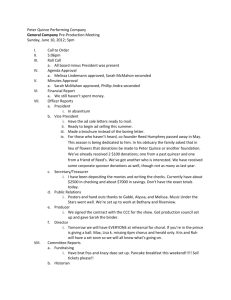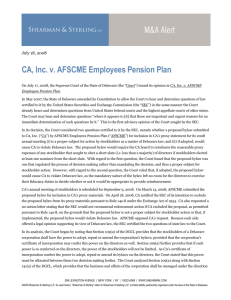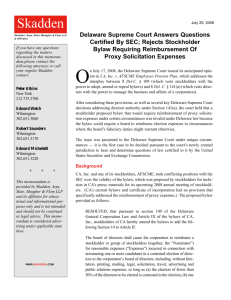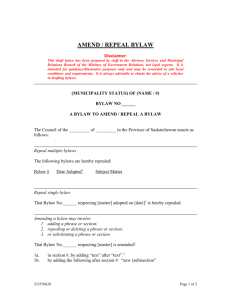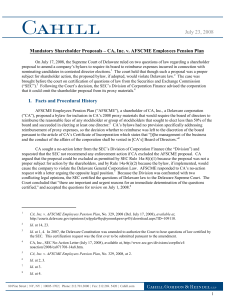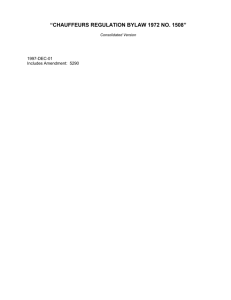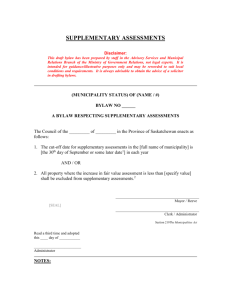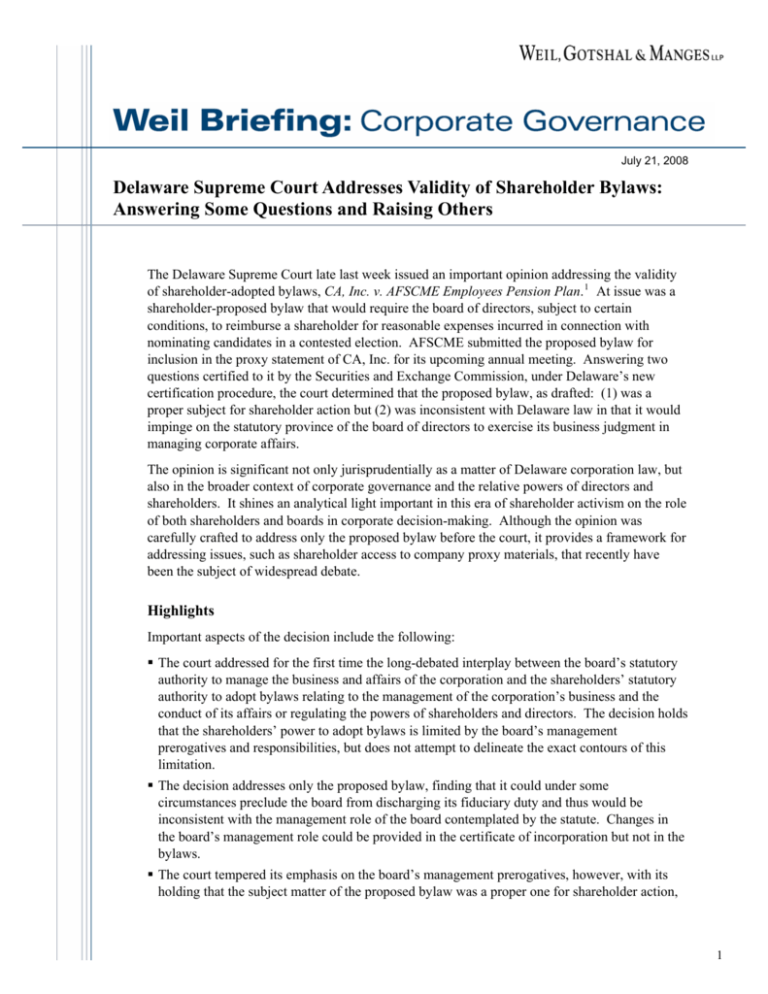
July 21, 2008
Delaware Supreme Court Addresses Validity of Shareholder Bylaws:
Answering Some Questions and Raising Others
The Delaware Supreme Court late last week issued an important opinion addressing the validity
of shareholder-adopted bylaws, CA, Inc. v. AFSCME Employees Pension Plan. 1 At issue was a
shareholder-proposed bylaw that would require the board of directors, subject to certain
conditions, to reimburse a shareholder for reasonable expenses incurred in connection with
nominating candidates in a contested election. AFSCME submitted the proposed bylaw for
inclusion in the proxy statement of CA, Inc. for its upcoming annual meeting. Answering two
questions certified to it by the Securities and Exchange Commission, under Delaware’s new
certification procedure, the court determined that the proposed bylaw, as drafted: (1) was a
proper subject for shareholder action but (2) was inconsistent with Delaware law in that it would
impinge on the statutory province of the board of directors to exercise its business judgment in
managing corporate affairs.
The opinion is significant not only jurisprudentially as a matter of Delaware corporation law, but
also in the broader context of corporate governance and the relative powers of directors and
shareholders. It shines an analytical light important in this era of shareholder activism on the role
of both shareholders and boards in corporate decision-making. Although the opinion was
carefully crafted to address only the proposed bylaw before the court, it provides a framework for
addressing issues, such as shareholder access to company proxy materials, that recently have
been the subject of widespread debate.
Highlights
Important aspects of the decision include the following:
The court addressed for the first time the long-debated interplay between the board’s statutory
authority to manage the business and affairs of the corporation and the shareholders’ statutory
authority to adopt bylaws relating to the management of the corporation’s business and the
conduct of its affairs or regulating the powers of shareholders and directors. The decision holds
that the shareholders’ power to adopt bylaws is limited by the board’s management
prerogatives and responsibilities, but does not attempt to delineate the exact contours of this
limitation.
The decision addresses only the proposed bylaw, finding that it could under some
circumstances preclude the board from discharging its fiduciary duty and thus would be
inconsistent with the management role of the board contemplated by the statute. Changes in
the board’s management role could be provided in the certificate of incorporation but not in the
bylaws.
The court tempered its emphasis on the board’s management prerogatives, however, with its
holding that the subject matter of the proposed bylaw was a proper one for shareholder action,
1
even though the bylaw would have required an expenditure of corporate funds. The court
explained that, in providing reimbursement of election expenses of successful rival candidates,
the bylaw would facilitate the shareholders’ right to participate in selecting the candidates for
election to the board, a “a subject in which the shareholders … have a legitimate and protected
interest.” 2 Because the bylaw would facilitate that purpose, the fact that it would require the
expenditure of corporate funds would not, by itself, make the bylaw an improper subject of
shareholder action.
Rather, the deficiency of the proposed bylaw arose from violating the prohibition developed in
the court’s case law against “arrangements that commit the board of directors to a course of
action that would preclude them from fully discharging their fiduciary duties to the corporation
and its shareholders.” 3 The court’s discussion raises the possibility that a similar bylaw might
be considered valid if it contained a “fiduciary out” provision—under which the board could
deny reimbursement if it determined that in light of particular circumstances application of the
corporation’s funds to reimbursement would be contrary to the best interests of the corporation
and its shareholders.
In reaching its conclusions on the two questions, the court drew a distinction between bylaws
that “define the process and procedures by which” business decisions are made—the “proper
function” of bylaws—and bylaws that purport to “mandate how the board should decide
specific substantive business decisions”—an improper function of bylaws. 4 The court
eschewed articulating “with doctrinal exactitude a bright line that divides those bylaws that
shareholders may unilaterally adopt . . . from those which they may not,” 5 noting that such a
determination is highly contextual. 6 It pointed out that the proposed bylaw “would encourage
candidates other than board-sponsored nominees to stand for election” and even suggested how
the bylaw could have been written to be on its face validly process-oriented. 7
The Future of Shareholder-Proposed Bylaws Relating to Director Elections
The CA decision is likely to be much discussed in the ongoing debate over the role shareholders
should play in corporate governance and the relative roles which federal and state law should
play in establishing and regulating shareholder rights.
The court’s discussion leaves open whether a shareholder-adopted bylaw providing for
reasonable shareholder access to company proxy materials for shareholder nominees would be
valid, given the expenditure of corporate funds that would be involved and the other
considerations that may affect the directors’ ability to satisfy their fiduciary duties with regard
to providing access.
The decision is almost certain to increase the attention—already significant—of activist
shareholders on attaining access. Commenting on the decision, an AFSCME representative
stated, “the focus for shareholders has to be on the [SEC] and the creation of an appropriate
right of shareholder access at the federal level.” 8
At the same time, the decision’s affirmation of shareholder power to regulate election
procedures and its focus on the board’s fiduciary role in acting on behalf of the company in
specific situations (actions themselves subject to judicial review) provide a framework for
developing access procedures under state law, without any action at the federal level.
2
The decision will likely affect the SEC’s further consideration of the issue of the permissibility
of access proposals under Rule 14a-8, as it revisits, as proposed by Chairman Cox, a change in
the rule it considered but rejected last year that would have permitted access proposals in the
form of bylaw amendments where such bylaws were permitted by state law. 9
The opinion’s dual emphasis on the role of the board in making specific decisions and the role
of the shareholders in establishing corporate procedures through bylaws may also provide
fertile ground for dealing with some of the complex problems that are associated with access
proposals, such as which, and how many, shareholders may have access to a company’s proxy
materials, and for how many nominees, in any one election.
Background and Analysis of the Opinion
Earlier this year, AFSCME Employees Pension Plan submitted under SEC Rule 14a-8 a proposed
“mandatory reimbursement bylaw” for inclusion in CA’s 2008 proxy materials. The proposed
bylaw, if adopted by the stockholders, would require the board of directors to cause CA to
reimburse a stockholder or group of stockholders (the “Nominator”) for “reasonable expenses . . .
incurred in connection with nominating one or more candidates in a contested election of
directors” if, among other conditions, “(a) the election of fewer than 50% of the directors to be
elected is contested in the election, [and] (b) one or more candidates nominated by the Nominator
are elected to the corporation’s board of directors.” AFSCME explained that it was limiting the
reimbursement right provided by the proposed bylaw to a slate of nominees who would not
constitute a majority of the board, because a majority slate, if elected, could as a practical matter
apply the corporation’s funds to reimburse their expenses. 10
CA proposed to exclude the bylaw from inclusion in its proxy materials, and it requested a noaction letter from the SEC. CA and its Delaware counsel argued that the bylaw should be
excluded because it would conflict with Delaware law and was not a proper subject for
stockholder action. 11 AFSCME and its Delaware counsel countered that the proposed bylaw
would be valid under Delaware law. The SEC was thus presented with conflicting opinions
concerning the governing corporation law. Invoking for the first time a procedure authorized last
year by an amendment to the Delaware constitution, the SEC certified to the Delaware Supreme
Court the following questions:
Is the AFSCME proposal a proper subject for action by shareholders as a matter of Delaware
law?
Would the AFSCME proposal, if adopted, cause CA to violate any Delaware law to which it
is subject?
The Delaware Supreme Court accepted briefs on an expedited schedule and then heard argument
from AFSCME and CA on July 9, 2008, rendering its opinion equally expeditiously, just over a
week after argument.
Following the decision, the SEC Staff issued a no-action letter to CA permitting it to exclude the
proposal from its proxy statement as being contrary to applicable Delaware law.
3
Certified Question 1: The Bylaw Is a Proper Subject for Shareholder Action Because It
Regulates the Process of Director Selection
The first certified question required the court to address a tension between sections 109(a) and
141(a) of the Delaware General Corporation Law (DGCL). Section 109(a) gives stockholders
“the power to adopt, amend or repeal bylaws.” It also allows a corporation to confer, in its
certificate of incorporation, such power on its directors, provided that the conferral of power on
the directors does not limit the stockholders’ power. Section 141(a) provides that “[t]he business
and affairs of every corporation . . . shall be managed by or under the direction of a board of
directors, except as may be otherwise provided in [the DGCL] or in its certificate of
incorporation.”
According to the court, section 109(a) might be understood, when read in isolation, as providing
shareholders and directors with “identical, coextensive power” to adopt bylaws. 12 But when read
in light of section 141(a), “the shareholders’ statutory power to adopt . . . bylaws is not
coextensive with the board’s concurrent power and is limited by the board’s management
prerogatives under section 141(a).” 13 Read in that context, the proposed bylaw presented a
tension between the right of stockholders to participate in the director election process by
nominating an opposing slate and the board’s substantive decision-making authority to decide
whether or not to reimburse director election expenses.
In analyzing what the limits on the shareholders’ right to adopt bylaws might be, the court also
considered DGCL sections 109(b) and 102(b)(1). Section 109(b) provides that the bylaws may
contain “any provisions, not inconsistent with law or the certificate of incorporation, relating to
the business of the corporation, the conduct of its affairs, and its rights or powers or the rights or
powers of its stockholders [or] directors.” Section 102(b)(1) provides that the certificate of
incorporation may contain provisions “for the management of the business and for the conduct of
the affairs of the corporation, and any provision creating, defining, limiting and regulating the
powers of the corporation, the directors and the stockholders.” Notably, section 102(b)(1) does
not mention limiting the powers of directors by bylaw provisions, which CA argued made the
proposed bylaw inconsistent with Delaware law.
Rejecting the idea that any bylaw that might be viewed as limiting or restricting in any respect the
power of the directors would be impermissible, the court distinguished a bylaw that “establishes
or regulates a process for substantive decision-making” from one that “mandates the decision
itself.” 14 Emphasizing the legitimate shareholder interest in the director election process (as
detailed above), the court observed that the bylaw was intended to “promote the integrity of that
electoral process by facilitating” shareholder nomination of director candidates. The court
therefore held that the bylaw “is a proper subject for shareholder action,” rejecting the idea that
the fact that the bylaw would require an expenditure of corporate funds altered the bylaw’s
process-oriented character. 15
Certified Question 2: The Bylaw Is Invalid Because It Would Bind the Board to Take Actions
That Might Breach Its Fiduciary Duties
Pointing out that the second question certified to it “requested a determination of the validity of
the Bylaw in the abstract” and “therefore, in response … we must necessarily consider any
possible circumstance under which a board of directors might be required to act” under the
proposed bylaw, the court held that the proposed bylaw, as drafted, “would violate the prohibition
4
. . . against contractual arrangements that commit the board of directors to a course of action that
would preclude them from fully discharging their fiduciary duties to the corporation and its
shareholders.” 16 The court cited Paramount Communications, Inc. v. QVC Network, Inc., in
which the Delaware Supreme Court invalidated a “no-shop” provision in a merger agreement
because it would preclude the board from taking actions that might be required by its fiduciary
duties, and Quickturn Design Systems, Inc. v. Shapiro, in which the Delaware Supreme Court
invalidated a poison pill with a delayed redemption provision because that provision might
deprive any newly elected board of its managerial authority under section 141(a) and prevent the
board from exercising its fiduciary duties.
The court rejected AFSCME’s arguments that, because the proposed bylaw was to be adopted by
the shareholders (rather than the board, as in the case of the provisions involved in QVC and
Quickturn) and would remove entirely from CA’s board any discretion with respect to
reimbursement of election expenses in the circumstances specified in the bylaw, there could be
no conflict with the board’s discharge of its fiduciary duty regarding reimbursement. This
argument, the court concluded, “concedes the very proposition that renders the Bylaw, as written,
invalid: the Bylaw mandates reimbursement of election expenses in circumstances that a proper
application of fiduciary principles could preclude.” 17 Referencing the (sparse) Delaware case law
on the subject, the court pointed out that a board may permissibly expend corporate funds to
reimburse proxy contest expenses where the contest “is concerned with a question of policy as
distinguished from personnel o[r] management.” 18 “But,” it elaborated, “in a situation where the
proxy contest is motivated by personal or petty concerns, or to promote interests that do not
further, or are adverse to, those of the corporation, the board’s fiduciary duty could compel the
reimbursement be denied altogether.” 19 Accordingly, the bylaw’s provision limiting
reimbursement to “reasonable” expenses did not remedy its deficiency. Seemingly
contemplating a bylaw that, in contrast to the proposed bylaw before it, would “reserve to …
directors their full power to exercise their fiduciary duty to decide whether or not it would be
appropriate, in a specific case, to award reimbursement at all,” 20 the court noted that “a decision
by directors to deny reimbursement on fiduciary grounds would be judicially reviewable.” 21
*
*
*
If you have any questions about this development, please do not hesitate to speak with your
regular contact at Weil, Gotshal & Manges LLP. Questions may also be addressed to any of the
following: E. Norman Veasey, 302-656-1410, Robert Todd Lang, 212-310-8200, Stephen A.
Radin, 212-310-8770 or members of the Firm’s Public Company Advisory Group: Howard B.
Dicker, 212-310-8858; Cathy Dixon, 202-682-7147; Gil Friedlander, 214-746-8178; Holly J.
Gregory, 212-310-8038; P.J. Himelfarb, 202-682-7197; Robert L. Messineo, 212-310-8835; and
Ellen J. Odoner, 212-310-8438. Our e-mail protocol is firstname.lastname@weil.com.
1
2
3
4
5
6
No. 329, 2008 (Del. July 17, 2008).
Id., slip op. at 16.
Id. at 19.
Id. at 12.
Id.
Id. at 16.
5
7
8
9
10
11
12
13
14
15
16
17
18
19
20
21
Id. at 15 & n.20.
K. Scannel & J. Burns, Delaware Court Rules For CA in Suit, WALL ST. J., July 18, 2008, at C6 (quoting Richard Ferlauto,
AFSCME’s Director of Pension Investment).
Concerning the SEC’s consideration last year of the treatment of access proposals under Rule 14a-8, see our July 27 and November
29, 2007, Weil Briefings at http://www.weil.com/wgm/cwgmhomep.nsf/Files/Briefings019_2007/$file/Briefings019_2007.pdf and
<http://www.weil.com/wgm/cwgmhomep.nsf/Files/Briefings022_2007/$file/Briefings022_2007.pdf>.
See CA, Inc., SEC No Action Letter, available June 27, 2008 (attachment to incoming letter).
Rule 14a-8(i)(1) provides that a corporation may exclude from its proxy materials a shareholder proposal that “is not a proper
subject for action by shareholders under the laws of the jurisdiction of the company’s organization.” 17 C.F.R. § 240.14a-8(i)(1).
Rule 14a-8(i)(2) provides that a corporation may exclude from its proxy materials a shareholder proposal that would “cause the
company to violate any state . . . law to which it is subject.” 17 C.F.R. § 240.14a-8(i)(2).
CA, Inc. v. AFSCME Employees Pension Fund, slip op. at 6.
Id. at 7.
Id. at 10-11, 14.
Id. at 14, 16-18. The court also explicated the interaction of (i) the exception in section 141(a) to the board’s managerial authority
provided by the reference therein to provisions otherwise specified in the DGCL with (ii) section 109’s grant of authority to
shareholders to adopt, amend and repeal bylaws, holding that section 109 does not create an exception to section 141(a); rather
section 109 provides that bylaws cannot be “inconsistent with law,” including section 141(a). Id. at 7, n. 7.
Id. at 19.
Id. at 22.
Id. at 22 (citing Hall v. Trans-Lux Daylight Picture Screen Corp., 171 A. 226, 227 (Del. Ch. 1934); Hibbert v. Hollywood Park,
Inc., 457 A.2d 339, 345 (Del. 1983)).
Id. at 22-23.
Id. at 23.
Id. at 23 n. 35. The court did not address the standard of review that would apply to such a decision, but cited the Chancery Court
decision in Blasius Indus. Inc. v. Atlas Corp. 541 A.2d 651 (Del. Ch. 1988), which provides for an enhanced review of actions that
might frustrate the exercise of the shareholder franchise, in discussing the legitimate shareholder interest in the subject of the
proposed bylaw. Id. at 16 n. 21.
______________________________________________________________________________________________________
©2008 Weil, Gotshal & Manges LLP, 767 Fifth Avenue, New York, NY 10153, (212) 310-8000, http://www.weil.com ©2008.
All rights reserved. Quotation with attribution is permitted. This publication provides general information and should not be
used or taken as legal advice for specific situations, which depend on the evaluation of precise factual circumstances. The
views expressed in this publication reflect those of the authors and not necessarily the views of Weil, Gotshal & Manges LLP.
If you would like to add a colleague to our mailing list or if you need to change or remove your name from our mailing list,
please log on to http://www.weil.com/weil/subscribe.html, email subscriptions@weil.com, or call (646) 728-4056.
6

